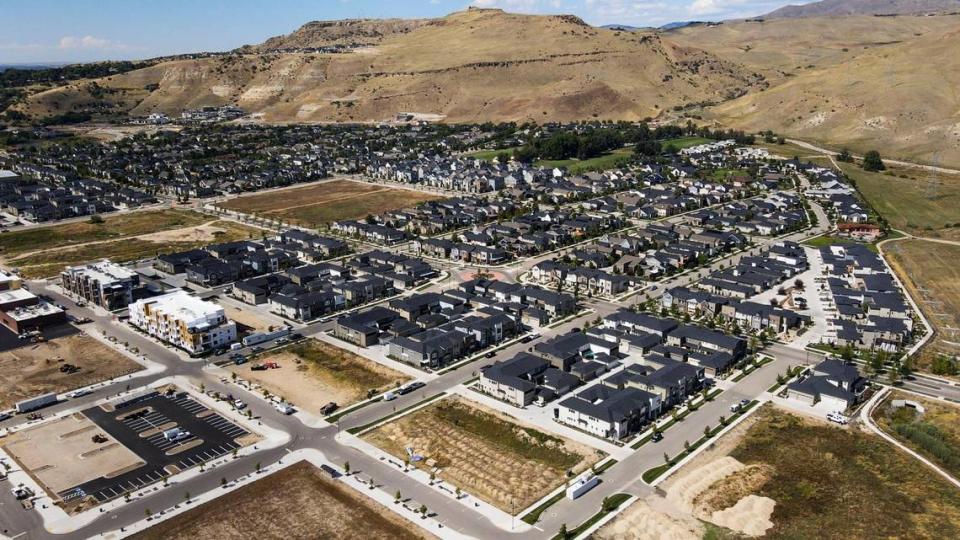A special taxing district in Boise may have a new fight on its hands after allegedly overtaxing residents $2.4 million over three years.
Some residents of Boise’s Barber Valley say the Harris Ranch Community Infrastructure District improperly and excessively taxed them. According to an October letter from the Idaho Attorney General’s Office, they may be right.
These taxing districts, known as community infrastructure districts or CIDs, are allowed to collect taxes only to pay for bonds that have been both approved and issued, according to the letter from Associate Attorney General Jeffery Ventrella.
The district, however, collected taxes for approved bonds that had not yet been issued and, according to the homeowners, may never be collected, because of a pending lawsuit before the Idaho Supreme Court.
That lawsuit, brought by the Harris Ranch CID Taxpayers Association, challenges the legality of the taxing district. A district judge rejected the association’s argument. The association then appealed.

Legalized in 2008, community infrastructure districts are meant to ensure growth pays for itself. Homeowners within these districts pay extra taxes for new public infrastructure, like roads and roundabouts, that the developer then builds for the surrounding community.
This means others in different parts of the city, such as residents in Northwest Boise, don’t have to pay higher taxes for infrastructure in Harris Ranch they won’t use, such as new sewers.
The association’s request that the district refund the $2.4 million is separate from the lawsuit.
Nicholas Warden, a Boise lawyer representing the association, said the district’s audited financial statements showed the payments required on outstanding bonds for the district in 2022, 2023 and 2024 totaled $993,000 per year. He said the board collected $400,000 more than that in 2022 and $1.1 million more than that in 2023, and has already approved collecting $900,000 more than that in 2024.
The $2.4 million in extra taxes affect about 1,000 homeowners within the boundaries of the district, Warden said in a September letter to the Attorney General’s Office and the Idaho State Tax Commission.


“That means the average homeowner in the Boise CID will have had to pay more than $2,400 in unnecessary and unlawful property taxes over just three years, and some homeowners will have had to pay much more than that,” Warden wrote.
“It doesn’t make any sense,” Crowley said by phone. “It just boggles me.”
Crowley said the association has raised these questions with the CID board over the last three years and approached House Minority Leader Ilana Rubel, D-Boise, who represents the district, to take up their cause with the Attorney General’s Office. Rubel asked the office whether taxes to pay for not-yet-issued bonds were legal, and Ventrella’s letter was its answer.
Boise City Council members make up the three-person CID board. Patrick Bageant, the board chair, said in a July board meeting months before the attorney general’s October letter that he understood the concern and that it was “kind of true in the abstract” that they were collecting extra money.
“(But) it gets used to service the existing debt or to pay down the debt in advance of schedule, so it’s still doing its purpose. It’s not like we collect it and sit on it and have it,” Bageant said. “One way or the other the debt has to be paid.”
However, Crowley contends the board has been blocked from issuing new bonds since 2021, when the taxpayers association first sued the district. He said the association does not know what the excess money has been used for.
According to Ventrella, if a bond has been approved but not issued, then that bond does not exist.
This embedded content is not available in your region.
“A taxing district cannot impose and collect taxes to pay debt service that does not exist. But the Boise CID did so and has approved doing so again over the association’s objections,” Warden wrote in his September letter. “There is simply no justification for the Boise CID to levy and impose special property taxes for approved but unissued bonds.”
Crowley said the excess collections were unlawful and said there would have been no adverse effects if the district limited tax collections to the roughly $1 million needed. He said that would reduce the homeowners taxes almost 50%.
Warden said homeowners within the community infrastructure district pay 40% more on average in property taxes than “substantially identical” homes in the Harris Ranch development that are outside the district and elsewhere in the city.
He requested in his September letter that the board refund the $2.4 million to the homeowners or credit them on their tax bills for next year’s tax levy. The association plans to file a formal request in the coming weeks.
Changing rules
Meanwhile, the make-up of the CID board will change next year.
According to a news release from the city of Boise, the Idaho Legislature passed a bill this year requiring one of the board seats to be held by a resident of the district. The remaining two seats are to be held by the Boise City Council member who represents the district, who in this case is Meredith Stead, and an at-large council member.
The city is seeking applications from residents of the CID district. The resident board member must be selected by Mayor Lauren McLean and confirmed by the council.
Applicants must be able to meet up to 10 times a year with four to five meetings between June and September. The resident board member would serve a four-year term.
A cover letter and resume can be emailed to [email protected]. The deadline to apply is 5 p.m. Monday, Dec. 11.
Harris Ranch homeowners lost a key battle against special taxes. Now they’re trying this
Should growth pay for itself? Why tax district claiming to do that angers some Boiseans
Harris Ranch taxpayers take their fight against special tax district to new battlefield
Boise homeowners went to court to try to void a tax district. See what a judge decided

Amanda Smith is a dedicated U.S. correspondent with a passion for uncovering the stories that shape the nation. With a background in political science, she provides in-depth analysis and insightful commentary on domestic affairs, ensuring readers are well-informed about the latest developments across the United States.





:max_bytes(150000):strip_icc():focal(773x244:775x246)/jerry-boylan-conception-captain-sentencing-050224-ff606da1f0a5449fbe90b80de4cad30d.jpg)
